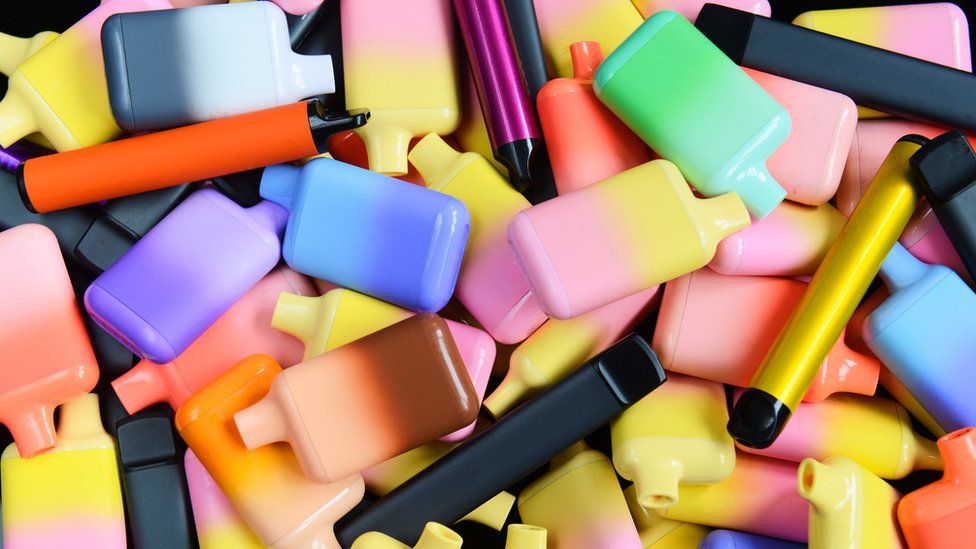How dangerous is vaping, what is the disposable vape ban and what is the vaping tax?
- Published

The government has said it will introduce a new tax on vaping products.
It has already announced plans to ban disposable vapes, to help cut the number of children vaping.
Is vaping dangerous?
Vaping is nowhere near as harmful as smoking cigarettes.
But health experts agree that anyone who doesn't smoke should not start vaping.
Children's doctors say vaping may cause long-term damage to young people's lungs, hearts and brains.
The vapour inhaled contains a small amount of chemicals, including the addictive substance nicotine.
More research is needed to fully understand the health effects.
Another issue is that illegal vapes are widely available and are much more likely to contain harmful chemicals or drugs, such as cannabis.
What is the new tax on vaping products?
The government will introduce a new tax on vaping products, Chancellor Jeremy Hunt said in the Budget.
At the moment, vaping products are subject to value added tax (VAT) - but unlike tobacco, do not also attract a separate levy.
The vaping products duty will start in October 2026. The government has launched a consultation.
According to the proposals, the amount of duty will depend on how much nicotine is in the vaping liquid:
- £1 per 10ml for nicotine-free liquids
- £2 per 10ml for liquids that contain 0.1-10.9mg
- £3 per 10ml for liquids that contain 11mg or more (roughly more per ml than a cigarette)
Duty on tobacco will go up by £2 per 100 cigarettes at the the same time to ensure that vaping remains cheaper.
When will disposable vapes be banned?
Health Secretary Victoria Atkins told the BBC she was confident the ban would come into force in early 2025.
Once the timing is confirmed, retailers will have six months to make the changes.
The government also plans to make all vapes less attractive to young people by:
- reducing the use of flavours designed to appeal to children
- introducing plain packaging
- changing the way vapes are displayed in shops - moving them behind the counter
It is already illegal to sell vapes to under-18s, but the government will increase fines for retailers which do so.
How many children vape?
Nearly 8% of 11-17 year olds vape, according to figures from an online survey of 2,000 children by health charity ASH (Action on Smoking and Health). That's up from 4% in 2020.
It said 20% have tried vaping, with cheap, brightly-coloured disposable vapes driving up the increase from 14% three years ago.
Older teenagers are more likely to have tried vaping or be current vapers.
Vaping is now twice as common as smoking among children.
What are the vaping rules in other countries?
Many countries have seen a rise in vaping among children and young people.
In response, the US has banned some vape flavours like mint and fruit in particular e-cigarettes.
It also said it would ban products from Juul, one of the country's most popular vaping companies.
Australia has announced e-cigarettes will only be available on prescription, for smokers who want to give up tobacco.
New Zealand brought in new rules in 2023, banning most disposable vapes and targeted flavours which appeal to children.
Countries including South Korea, India and Brazil have brought in very strict vape rules, while China has announced restrictions.
However, 88 countries have no minimum age for buying vapes, and 74 have no laws in place for e-cigarettes, according to the World Health Organization (WHO).
Why is vaping better than smoking?
Cigarettes contain tobacco, tar and a host of cancer-causing toxic chemicals and are the largest preventable cause of illness and death in the UK.
About half of all life-long smokers will die early, losing on average about 10 years of life.
That's why people who smoke are urged to stop, with nicotine vapes the most effective quit tool - better than nicotine patches or gum.
Recent research also suggests people having face-to-face support while using vapes can be up to twice as likely to stop smoking than those using other methods.
But vaping is not harmless, so it's only recommended for adult smokers.
They are offered free vape kits on the NHS to help them quit as part of its "swap to stop" programme.
More than two million smokers and ex-smokers who use disposable vapes would be affected by a ban, according to research by UCL.
Thousands of people have given up smoking using vaping as an alternative. Fewer people in the UK are smoking than ever before - around 13%.
Why are disposable vapes bad for the environment?
Campaigners say the materials and chemicals used to make vapes - including their lithium batteries - make them difficult to dispose of safely.
They can be recycled, but only 17% of vapers do so.
An estimated five million disposable vapes are thrown away each week in the UK.